|
 |
 |
Hong Kong Hot, Euro Not, OPEC looms
International
Perspectives 2/14//00
By Anne D. Picker, International Economist |
The
markets bumpy ride
With the spate of interest rate increases over for the time being, attention
is turning back to measures of economic performance. Several indicators
released last week began to show some fallout from millennium splurges
and precautionary expenditures, especially on production and sales data,
making it difficult to evaluate the numbers. The data mostly disappointed
market players, leaving them wondering if higher interest rates might
not harm the nascent recovery in Europe and slow production too much
in Britain. The saga will continue as new data become available …
|
Selected
World Equity Indexes
|
|
|
Index
|
11-Feb
|
4-Feb
|
Week
percent Change
|
|
Asia
|
|
|
|
|
|
Australia
|
All Ordinaries
|
3167.10
|
3115.10
|
1.67
|
|
Japan
|
Nikkei 225
|
19710.02
|
19763.13
|
-0.27
|
|
Hong Kong
|
Hang Seng
|
17380.30
|
15968.12
|
8.84
|
|
S. Korea
|
KOSPI
|
953.22
|
950.22
|
0.32
|
|
Singapore
|
Straits Times
|
2234.92
|
2258.91
|
-1.06
|
|
|
|
|
|
|
|
Europe
|
|
|
|
|
|
Britain
|
FTSE 100
|
6193.30
|
6185.00
|
0.13
|
|
France
|
CAC
|
6287.01
|
6275.72
|
0.18
|
|
Germany
|
DAX
|
7611.55
|
7444.61
|
2.24
|
|
|
|
|
|
|
|
North America
|
|
|
|
|
|
United States
|
Dow
|
10425.21
|
10963.80
|
-4.91
|
|
Canada
|
TSE Comp 300
|
9156.70
|
9209.20
|
-0.57
|
|
Mexico
|
Bolsa
|
7623.47
|
7236.54
|
5.35
|
Asia
The Nikkei tops 20,000 again
Investors ignored a government warning that the Japanese economy may
have slipped back into recession in the last quarter of 1999 and bought
equities anyhow (a recession is defined as two consecutive quarters
of negative economic growth.) However, enthusiasm for technology and
exporters continued unabated despite the fresh doubts whether Japanese
economic growth can be sustained without heavy fiscal stimulus. Traders
seem less concerned about Japan's overall economic health and have abandoned
stocks from the shipbuilding, construction, retail and other industry
sectors that are reliant on a buoyant domestic economy. Rather, technology
related stocks or shares of companies that claim to be undergoing significant
restructuring have thrived. That has led to an extremely narrow market
with few issues providing leadership and no signs of any broadening.

On Wednesday, the
Nikkei 225 index closed above the 20,000 mark for the first time since
July 31, 1997. However, shares fell Thursday on profit taking and ahead
of a three day weekend. The Tokyo markets were closed Friday for a national
holiday. The Nikkei ended the week down 53 points or 0.3 percent at
19,710.
The
Hang Seng celebrates lunar new year with record high
The Hong Kong Hang Seng index welcomed the year of the dragon with a
roar when trading resumed on Tuesday. Led by a powerful surge in the
territory's new economy stocks, the index soared in the busiest trading
in more than two years. The furious rally reflects the higher value
investors are giving to media and telecommunications stocks throughout
the world.
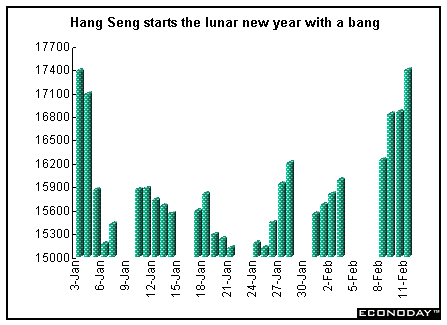
After a poor performance
in January, when the Hang Seng dropped about 9 percent and suffered
through extreme bouts of volatility, the market came storming back,
wiping away almost all of those losses. The Hang Seng closed the week
at 17380, up 8.84 percent or 1,412 points!
Europe
FTSE Steady, DAX sets new highs
The FTSE's week was divided into two parts - before and after the Bank
of England Monetary Policy Committee (MPC) meeting. It ended the week
anticlimactically treading water. During the first part of the week,
trading was muted because investors were reluctant to make decisive
moves until after the MPC's meeting, though prices did rally Tuesday
led by media and technology stocks. Traders' sentiment was bolstered
by strong U.S. productivity gains that allow for rapid growth without
inflation. Market players took the MPC's 25 basis point interest rate
increase in stride, showing little or no reaction since it had been
widely expected. The FTSE-100 closed at 6193, about even on the week.
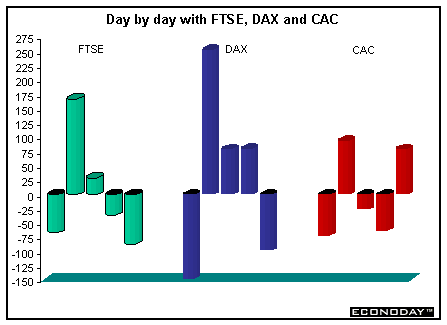
Both the Paris CAC
and German DAX continued to be driven by a boom in telecommunication
and technology shares. However, both markets experienced profit taking
and some disruptions because of the mega mergers taking place in Europe.
The markets were also cheered by U.S. productivity figures. The CAC
ended the week virtually unchanged at 6287 while the DAX rose to new
heights, closing the week at 7612, up 166 points or 2.24 percent.
Currencies
are reflecting trading uncertainties
The yen weakened amid renewed concerns the Japanese economic recovery
may be faltering. While the United States continues to prosper, Japanese
government officials warned that fourth quarter gross domestic product
would probably drop. This would be the second straight quarter of declining
GDP. Technically this would mean that Japan has slipped into recession
again.
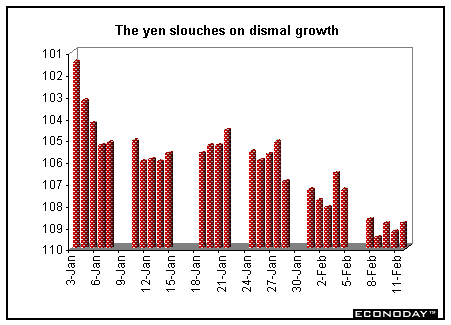
Strong U.S. productivity
data reinforced perceptions that the United States and Japanese economies
were on vastly different growth paths and that the Japanese economy
was a long way away from a sustained recovery. Last week's economic
data served to underline the differences.
The
euro - good news bad news
The euro was buffeted alternately by good then bad news last week. The
euro benefited only slightly from sagging U.S. stock markets. The euro
rose because of the better-than-expected improvement in German unemployment,
only to give back some of the gain because of strong U.S. productivity
numbers. The euro slumped on unsubstantiated rumors Austria was prepared
to leave the European Union in protest over its neighbors' harsh reaction
to the inclusion of the far-right Freedom Party in the coalition government.
Subsequent denials of the Austria rumors followed. The euro rallied
briefly because of the European Central Bank's strongly worded concerns
over the potential inflationary impact of recent euro weakness. The
ECB's monthly report said, "... the past movements of the exchange rate
of the euro have increasingly become a cause for concern with regard
to future price stability in view of their impact on consumer price
inflation via increases in the prices of final and intermediate imported
goods."
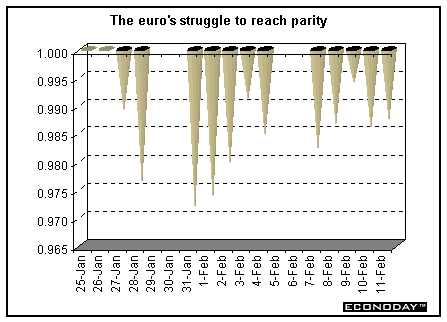
Finally, the decision
of the German cabinet to submit, unamended, its tax reform plans to
the legislature added fuel to the euro rally. Most important for the
euro would be the removal of capital gains tax on the sale of cross-shareholdings
- stakes built up by German companies in other national enterprises.
The reluctance of German companies to unwind these substantial cross
holdings partly because of high tax rates has been an important barrier
to corporate restructuring. However, the euro fell back later on concern
that the German tax reform proposals, which investors are counting on
to brighten business prospects in Europe, may meet opposition. Some
German states won't accept the proposals as written because they're
concerned they will lose tax revenue.
Central
banks race to raise interest rates
Bank of England joins the pack
The Bank of England's Monetary Policy Committee (MPC) raised their policy
making repurchase interest rate by 25 basis points to 6 percent last
week. The markets had anticipated this move, especially after the Federal
Reserve and the European Central Bank both raised their primary rates
by 25 basis points. The Bank offered no explanatory statement with the
announcement, probably preferring to wait for the publication of the
quarterly Inflation Report on Wednesday.

The widely expected
decision from the Bank of England's Monetary Policy Committee is the
fourth increase in the past six months. The Bank has changed rates 16
times in the past 33 months since being made independent. There had
been growing concern about rising consumer confidence and the steep
climb in house prices. British Retail Consortium figures show that retail
sales were 4 percent higher in January than a year earlier. And the
latest figures show house prices have been rising at 16 percent a year.
The MPC fears that these factors could indicate rising inflation and
is using interest rates to counter the threat.
The Bank of England's
short term lending rate - or base rate - sets the trend for interest
rates throughout the economy. So a rise to 6 percent will trigger similar
rises across the board in mortgage, credit card and hire purchase rates,
for example. Many analysts expect interest rates to continue rising
over the next few months, but they believe the base rate will stay below
its 7.5 percent peak in mid-1998. Analysts are already expecting interest
rates to rise again in the second quarter.
Bank
of Japan treads water
The Bank of Japan's Monetary Policy Board decided to leave its monetary
policy unchanged after a regular meeting last Thursday. The only comment
was that the decision was by majority.
Bank
of Korea also rises
The Bank of Korea raised its one day call rate to 5 percent from 4.75
percent. This is the first increase in Korea's benchmark short term
rate since April 1998. The primary reason for the increase was to reduce
the widening spread between long- and short-term rates, even though
inflation pressures are subdued. The Bank of Korea said it raised its
benchmark interest rate to discourage companies from piling up too much
short term debt and prevent the country's rapid economic revival from
sparking an increase in inflation. The rate increase marks the first
time South Korea's central bank has raised short-term rates since the
height of the country's currency crisis in December 1997.
Not
a central bank but…
The Hong Kong Association of Banks matched the Federal Reserve's 25
basis point increase and raised short term deposit rates to 4 percent.
The local rate setting cartel last raised deposit rates, a key interest
rate benchmark, on August 27, 1999. Because the Hong Kong dollar is
pegged to the U.S. dollar, Hong Kong needs to follow increases in U.S.
interest rates or risk capital flight. The association meets every Friday
to discuss possible changes to the deposit rates. The HKAB controls
rates on savings deposits of less than one week maturity.
Indicator
Scoreboard
Germany - The January seasonally
adjusted unemployment rate fell to 10.1 percent from 10.2 percent in
December, according to Bundesbank figures. The rate in the west declined
to 8.3 percent from 8.4 percent, while that in the east fell to 17.5
percent from 17.7 percent.
December manufacturing
output posted only a 0.2 percent monthly increase after falling
0.1 percent in November. While basic goods production rose 2.6 percent
and consumer goods production rose 0.5 percent on the month, both capital
goods and durable goods output declined. West German output rose 0.7
percent on the month after a 0.2 percent decline in November. In east
Germany, output was up 0.2 percent in the latest month after a 0.2 percent
decline the month before.
December seasonally
and calendar adjusted total real retail sales
(including auto and gas stations sales) fell 0.5 percent
on the month and 0.8 percent when compared with last year. Excluding
sales at auto dealerships and gas stations seasonally adjusted real
retail sales fell 0.3 percent on the month and but rose 1.0 percent
on the year. Most Bundesbank nominal (non-inflation adjusted) retail
sales subcategories fell both on the month and when compared with last
year, with auto sales showing the largest decline. Only food, beverage
and tobacco sales posted a gain.

The December seasonally
(but not inflation) adjusted trade surplus
rose to E4.2 billion - above the E3.4 billion of a year ago but below
the E5.9 billion surplus of November this year. Seasonally adjusted
exports declined 8.1 percent on the month but were up 9.1 percent on
the year. Imports dropped 5.0 percent from a month earlier but were
up 8.0 percent when compared with last year.
January final pan
German consumer price index rose
0.3 percent on the month and an annual rate of 1.6 percent, the highest
annual rate since December 1997. Moreover, fully 0.2 percentage points
of January's increase was due to higher energy taxes that took effect
Jan 1. Excluding heating oil and motor fuels, January CPI rose 0.2 percent
on the month and 0.7 percent on the year.
Britain
- Housing starts in the three months to December rose a seasonally
adjusted 3 percent on the quarter and were up 6 percent on the year.
However, total completions in the same period were down 5 percent on
the previous three months but rose 6 percent a year earlier.
Total new
construction orders in the three months to December rose
1 percent compared with the previous three months but fell 10 percent
on the year. December orders rose by 8 percent compared with November.
December manufacturing
production was down 0.3 percent compared to the previous
month, while industrial production, which also includes the output of
the utilities and the oil and gas sector, declined by 0.5 percent. There
was some evidence that the figures were affected by extended shutdowns
in many firms during the Christmas and Millennium holiday. Analysts
expressed surprise because the surveys had been telling a different
story.
Asia
Japan - 1999 household
spending fell 1.2 percent when compared with all of 1998.
December spending by wage earners fell 4.7 percent from a year earlier
in real terms. The propensity for wage earners to consume, a ratio that
measures the amount of disposable income that went to household spending
fell to 71.8 percent from 72.5 percent in November on a seasonally adjusted
nominal basis. During the October to December quarter of 1999, overall
household spending on a seasonally adjusted basis fell by 2.2 percent
compared with the June to July period.
Revised third quarter
gross domestic product dropped
1.0 percent on the quarter. The annualized rate was revised to a negative
3.9 percent from the previously announced 3.8 percent drop. The revised
consumption figures were not as weak, showing a fall of 0.2 percent
on the quarter instead of the previous 0.3 percent decline.

January domestic
wholesale price index was unchanged but declined 0.3 percent
when compared with a year earlier. The January domestic WPI decline
marked the 23rd successive month of year-over-year declines. January
increases in petroleum prices were offset by drops in prices of electrical
machinery and edible agricultural, livestock and fishery products.
December core private
sector machinery orders rose 16.1 percent. This is the biggest
monthly jump since October 1996 and good news for the Japanese economy.
Australia
- January employment
fell 27,600 while the unemployment rate
continued its decline to 6.8 percent, down from December's jobless rate
of 7.0 percent. January employment figures are often volatile, and analysts
said that the surprise drop is a temporary blip that doesn't alter the
outlook for employment growth in the first half of 2000.
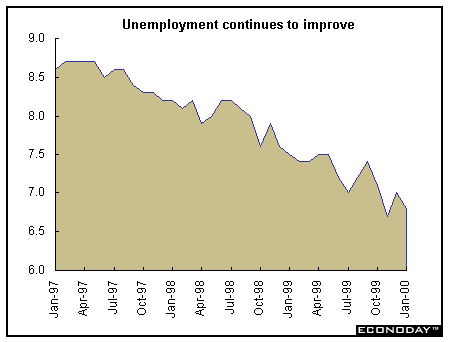
BOTTOM
LINE
Despite interest rate increases by all the major central banks except
the Bank of Japan, monetary policy makers are still fretting about inflation
in general, and oil in particular. With the March OPEC meeting looming
on the horizon, oil prices are rising on the London and New York markets.
The markets are concerned that OPEC members will continue their production
constraints despite shrinking supply and increased demand, pushing prices
still higher. Of major concern is how much of the price increases will
filter through the economy and raise overall prices. The markets will
be watching the data in coming weeks to find out.
|
Looking
Ahead: Week of February 14 to February 18, 2000
|
| Central Bank Activities |
| Feb 15 |
Japan |
Bank of Japan Monthly Report |
| Feb 16 |
Japan |
Bank of Japan Minutes of the
December 17, 1999 |
| |
|
Monetary Policy Committee
Meeting |
| Feb 16 |
UK |
Bank of England quarterly
inflation report released |
| Feb 17 |
EMU |
European Central Bank Monetary
Policy Meeting
|
The following indicators will be released this week…
|
| Europe |
|
|
| Feb 14 |
UK |
Producer Price Index (January) |
| Feb 15 |
UK |
Retail Price Index (January) |
| Feb 16 |
UK |
Labor Market (January) |
| |
Italy |
Industrial Production (December) |
| |
|
Balance of Payments (December) |
| |
Germany |
Wholesale Prices (January) |
| Feb 17 |
UK |
Retail Sales (January) |
| |
France |
Employment (Q4, 1999) |
| Feb 18 |
Germany |
Consumer Price Index (January) |
| |
France |
Merchandise Trade (November)
|
| Americas |
|
|
| Feb 16 |
Mexico |
Gross Domestic Product (Q4,
1999) |
| Feb 18 |
Canada |
Merchandise Trade (December) |
Release dates are
subject to change.
For U.S. data releases, see this week's Simply
Economics.
|








